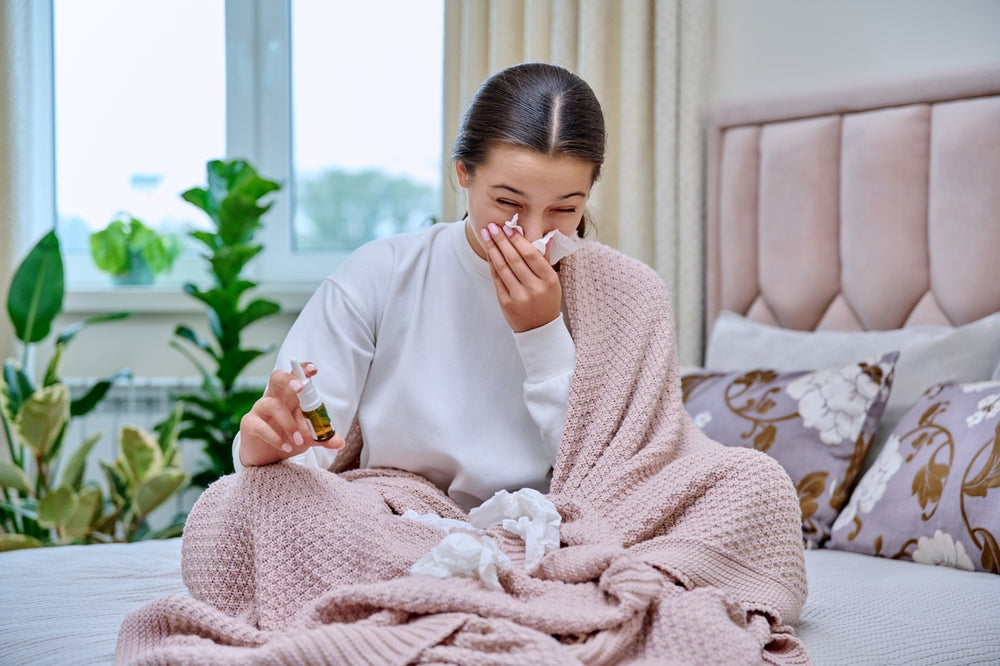Free U.S. Shipping On Orders Over $150

7 Tips to Manage and Prevent Pollen Allergies at Home
Posted on
Pollen from grass, weeds, flowers and trees is one of the most common causes of seasonal allergies (read our post on seasonal allergies and how to protect yourself).
But you don't have to go outside for pollen allergies to affect you. Because pollen is tiny, it can easily get into your home through windows, doors and gaps in insulation. People and pets can also carry pollen into the house.
Here are 6 tips on how to manage and prevent pollen allergies inside your home.
1. Prevent Pollen from Blowing In
You may not be able to fully stop pollen from getting in under the door and other small cracks around your home, but don't make it easy for it by throwing open your doors and windows. The cool breeze blowing in is nice, but it’s likely carrying with it pollen.
That’s not to say you should never open a window in your home. Check your local pollen forecast for when the pollen count will be high. For most places, this is between morning and early afternoon. You can open your windows when the pollen count goes down.
If you are particularly sensitive or allergic to pollen, you are better off keeping windows always closed during peak pollen season, which includes spring and summer. Use your AC, a portable AC or a window AC to keep your home cool.
Tip: Remember to keep your AC well maintained, including cleaning and replacing filters, to ensure it doesn't bring pollen into your home.
2. Check Your Ducts for Leaks
If your HVAC system has any leaks somewhere within the network of ducts, it could cause negative air pressure in your home. This is when there’s lower air pressure inside your home compared to the outdoors.
Negative air pressure draws air from outside through any gaps in insulation or under the doors. As it comes in, it introduces pollen and other allergens inside your home.
If you are getting pollen allergies despite keeping windows and doors closed, get a pro to check where there’s any leakage in your HVAC ductwork.
Exhaust fans, portable ACs, and clothes dryers can also cause negative air pressure, so check those too.
3. Reduce or Eliminate Carpeting
Carpets generally don't go well with allergies. That’s because the fibers trap lots of allergens, which are then released back into indoor air.
If you have a carpeted floor, it could be housing lots of pollen and causing pollen allergies even at night when pollen count is low outside. You can try vacuuming frequently with a HEPA vacuum to keep the carpets clean, but the best solution is to completely get rid of the carpeting.
Hard flooring like tile, wood or vinyl traps way fewer allergens, and it’s much easier to clean.
4. Clean and Vacuum Soft Furnishings Often
Other soft surfaces like the sofa and curtains also accumulate pollen and other allergens. But since those are harder to throw out, the best option is to clean and vacuum them often.
Also look for any soft furnishings that you can get rid of such as decorative teddy bears, extra rugs and anything else that’s not essential.
5. Allergy Proof Your Bedroom
The bedroom is a particularly bad place for pollen to build up. You spend hours each night there. If you have pollen allergies, pollen in your bedroom and bed will ruin your sleep and this has far reaching consequences on your health.
You can read our full post on how to allergy-proof your bedroom. Some of the tips we gave include getting a mattress protector to prevent pollen buildup on your mattress, washing bedding regularly and keeping windows closed when there’s lots of pollen in the air.
6. Get a Portable Air Purifier
It’s impossible to completely allergy-proof your home. Even a little pollen can affect people who have severe allergies or high sensitivity to pollen. It can also worsen respiratory conditions like asthma.
A portable HEPA air purifier provides extra protection against pollen and other allergens. These days there are smart air purifiers that can detect the amount of pollution in the air and automatically come on when necessary.
7. Wear a Mask
If you don't have an air purifier, another option is to wear a mask. Yeah, it feels weird to wear a mask at home, but it will protect you from any stray pollen that finds its way inside.
We recommend the Aplu mask. It’s designed to be super comfortable, so you won’t mind having it on the whole day. It also prevents acne, a common problem with most face masks.
Quick links
Contact
6063 Hudson Road #160
Woodbury, MN 55125
Yo@hercLeon.com
Leave a comment: